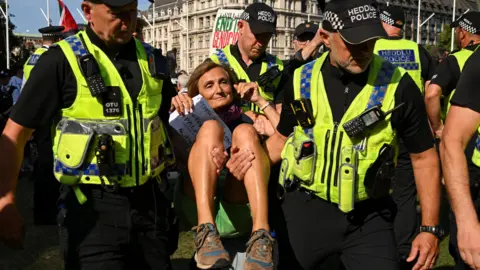**After Mass Arrests: The Future of the Palestine Action Ban**
The recent mass arrests of demonstrators who supported the now-banned group Palestine Action has stirred significant controversy in the UK. The protests, held in Parliament Square where participants held placards with messages such as “I support Palestine Action,” resulted in the apprehension of 522 individuals, a number that more than doubles the total arrests made under similar circumstances in 2024. Many of those arrested were elderly, with an average age of 54 and 112 individuals being over 70 years old, prompting discussions about the justice system’s treatment of older activists during these politically charged events.
In recent weeks, the question at the heart of the turmoil remains: what is the trajectory of the Palestine Action proscription? Officially labeled as a terrorist organization last month, the debate over the group has evolved from a purely legal matter into a major political and public relations issue. Efforts are underway by the organizers to utilize public sympathy to their advantage, as they plan further demonstrations in September with hopes of swaying the government to reconsider the ban.
The implications of these events raise crucial questions about free speech and the boundaries of acceptable protest within contemporary society. Prominent civil rights campaigners, such as Baroness Shami Chakrabarti, have characterized the protests as a pivotal moment akin to an “I am Spartacus” act of solidarity that challenges government control and civil liberties.
However, the outcome of this conflict hinges on three simultaneous legal battles. The ongoing arrests of over 700 individuals since July under terrorism laws indicates a significant pushback from law enforcement. Solicitors, including Katie McFadden, have remarked on the discomfort exhibited by police officers during these arrests, particularly considering the age demographic of those being charged. Legal analysts are considering the messages sent to the public if all arrested individuals are charged versus a selective prosecution.
So far, only three individuals have been formally charged for displaying support for Palestine Action during protests held earlier this year. The Director of Public Prosecutions, Stephen Parkinson, has had to consult with the Attorney General’s Office due to the sensitive nature of terrorism-related cases, which creates a delay for the majority of arrestees, leaving them to navigate a protracted justice process.
The consequences of a conviction are severe, potentially leading to significant life changes for those affected. Many protesters, however, are reportedly emboldened by their positions, viewing the ban as an infringement on free speech rather than an act of criminality. The co-founder of Palestine Action, Huda Ammori, emphasized on social media the resilience of their movement, asserting that the state could not withstand mass resistance.
As the case progresses to court, the legality of the ban will be scrutinized. Allegations surrounding Palestine Action’s activities, such as a notorious break-in at an Israeli defense firm in Bristol, will be pivotal in a forthcoming trial where charges will include violent disorder and aggravated burglary. This incident has subsequently informed the justification for the ban as authorities react to what they perceive as a shift towards militant tactics, including claims of vandalism and preparation for criminal activities.
In the backdrop of these developments, legal experts, including Jonathan Hall KC, have weighed in on the necessity for the ban on Palestine Action. They suggest that the group’s turn toward tactics that could be characterized as coercive has warranted governmental response. The imminent decision by the High Court on whether the Home Secretary’s actions were appropriate could reframe the legal landscape dramatically; a ruling in favor of the government would solidify the ban, while a decision against could overturn mass arrests.
This situation encapsulates the confluence of activism, legal discourses, and government authority in modern democratic societies. The outcome is poised to redefine the scope of civil liberties and protest rights grounded in the contentious issue of the Israeli-Palestinian conflict. Whether Palestine Action survives this governmental challenge remains to be seen—these legal battles will be a litmus test for the foundations of dissent in the UK and the public’s resilience against perceived governmental oppression.











